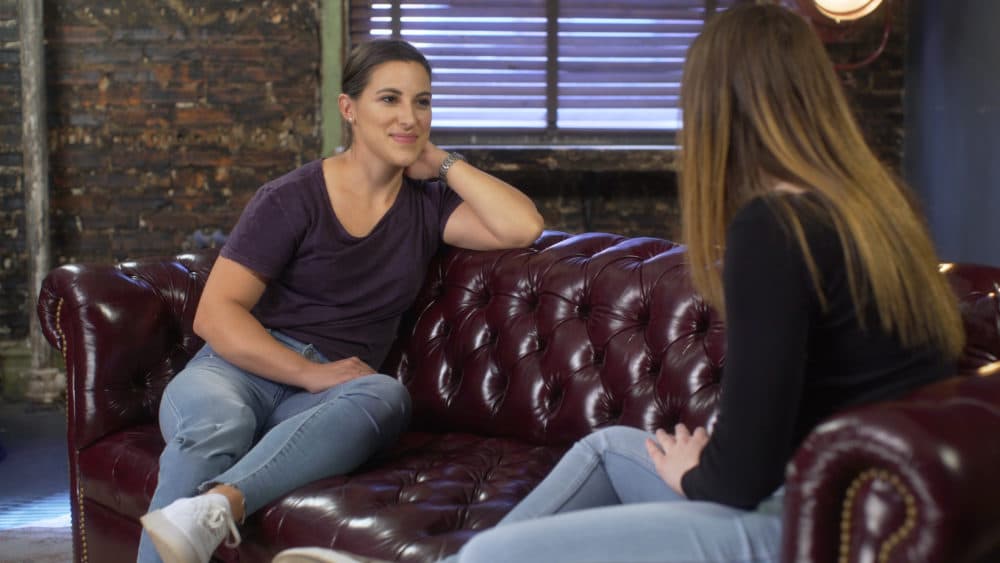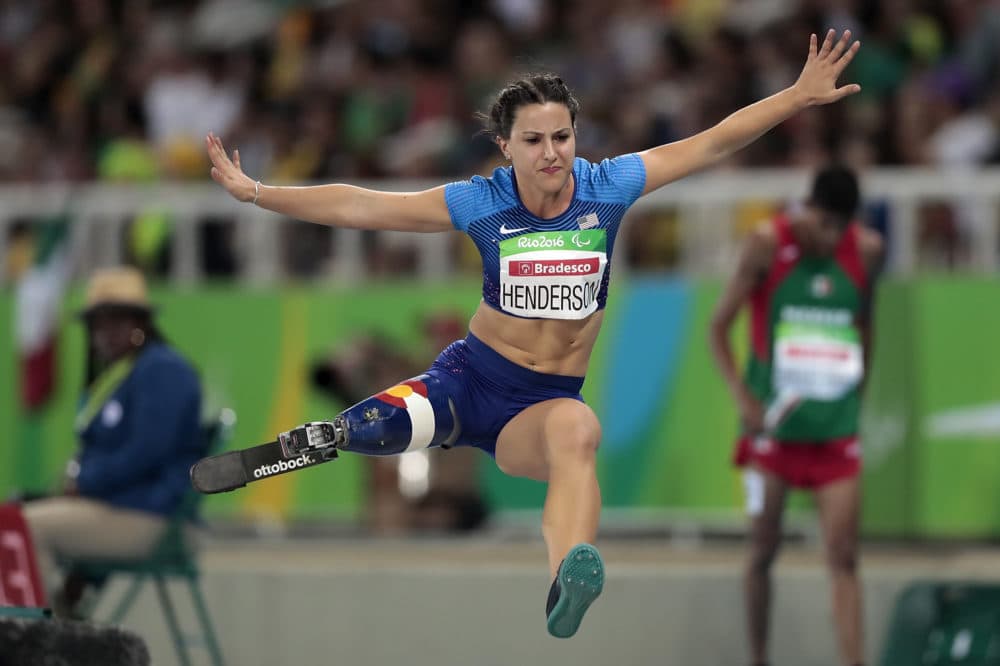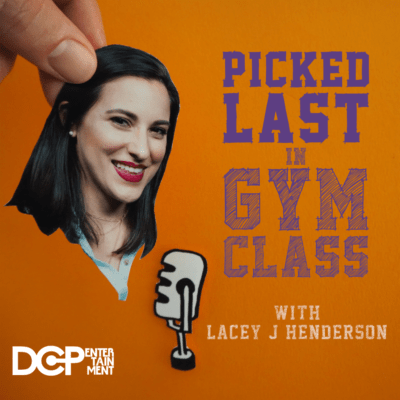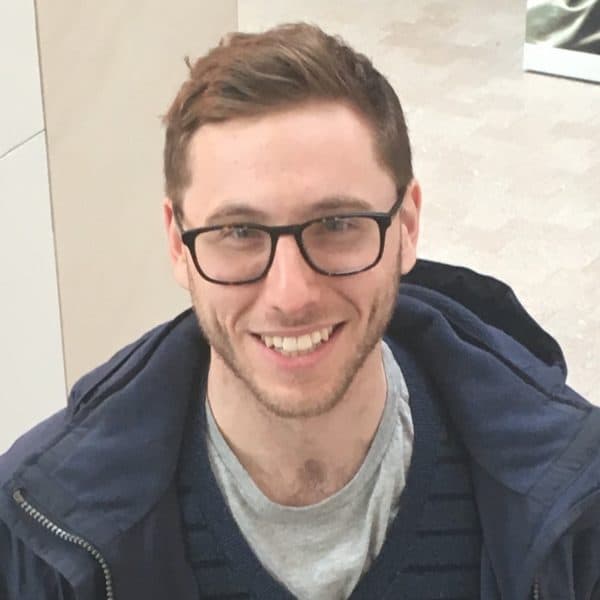Advertisement
From Paralympics To Podcasting: Lacey Henderson Finds Her People

Back in June, U.S. Paralympian Lacey Henderson launched a new podcast and video series called "Picked Last In Gym Class."
The show features conversations between Lacey and a range of guests — from athletes, to comedians, to entrepreneurs. Many of the guests also have disabilities.
"Because, you know, I'm trying to bring the people up, trying to bring my people up," she says.
But Lacey Henderson didn't always see people with disabilities as “her people.”
In fact, for a large portion of her life, she didn’t consider herself disabled.

'Things Didn't Make Sense'
Lacey Henderson was always an active kid, so when she told her parents about a pain in her right leg, they weren’t too concerned.
"They were like, 'Listen, it’s probably nothing. You’re probably sore from soccer. It’s probably growing pains,' " Lacey recalls.
Lacey was 9 years old. She had just started at a new school.
"So I was the only new kid. Brutal," Lacey says. "And now I was this new kid with this weird limp. And I'm like, 'No worries. It's just growing pains, guys.' ”
But the pain got worse — bad enough that Lacey, always one of the top athletes her age, started sitting out gym class.
"I couldn't straighten out my knee after awhile," she says. "So I was just walking on my toes. And it got to a point where my school's calling my parents, and they’re like, 'What is wrong with Lacey's leg? Like, what is actually going on?' ”
Advertisement
Lacey's parents took her to get an X-ray. Nothing seemed unusual.
"We got a prescription for an MRI. And that was where — there was a tumor about the size of a light bulb shown inside of my kneecap," she says.
Lacey went in for a biopsy.
"We talked about cancer," she says. "I didn't know anything about it. As a 9-year-old, I was like, 'I've heard the word "cancer." I see bald people, so probably not me because I have all my hair.' It just didn't — things didn't make sense.
"I wake up from the biopsy. I remember just being groggy, and the recovery room nurse is checking my vitals and my bags or whatever. And I was like, 'Do I have cancer?' And she was just so nonchalant. She's like, 'Yeah, honey, you do.' ”
Lacey had a rare form of cancer called Synovial sarcoma.
"And, I remember, I laid back down," Lacey says. "I put my face in the pillow. I started crying. And I just knew, like, at that moment, even though she seemed kind of cool with it, I was like, 'I just know that this is something big, and I'm not going to be the same. And I'm scared.' It was really scary."
"I was like, 'I just know that this is something big, and I'm not going to be the same. And I'm scared.' "
Lacey Henderson
Lacey says doctors wanted to amputate her leg immediately. But she and her family wanted to try chemotherapy first.
Lacey was supposed to do six full treatments. She only got through three. The chemo caused her organs to fail.
"There was, like, points when I was in the hospital where I was getting my vitals checked every 15 minutes," she says. "And I'll never forget: May 17, 1999, we had a meeting, and it was just, like, one of these conference rooms with four or five doctors and my family, and we were discussing our options, and there were not many options at this point.
"So our doctor, he spoke with other surgeons across the country, and he's like, 'Listen, we could try to peel this thing off like a potato.' He's like, 'I can't promise I'm going to get all your cancer cells. If we don't, we'll have to amputate really high. It's still a lot more chemo. It's a lot more radiation. It's a lot more treatment. Or we amputate, if you want to survive.' ”
Two days later, doctors amputated Lacey’s right leg above her knee.
'It Dawned On Me'
After that surgery and one final round of chemo that ended on her 10th birthday, Lacey got ready to go back to school — now wearing a pediatric prosthetic leg.
"I didn't know anything about the world of disability," she says. "I had never been around people with disabilities. I always, like, equated physical disability with developmental disabilities. And so, when I joined the physically disabled world, I was like, 'Oh, I'm still the same. I just got one leg. Like, no problem.'
"So, I go back to school. I'm back with my same classmates, and we got really into playing basketball during recess. And, you know, usually I'm, like, a top-three pick, like without question — never had to question it. And kids' names start getting called, and I'm like, 'All right, OK, I'll be realistic. Like, my hair is growing back. I still definitely look like I'm recovering from cancer. I have this pediatric prosthetic leg, which is, like, rainbow. It's like a glorified door hinge.' And I'm like, 'All right, OK, maybe I'll be middle of the pack. Let's be realistic.'
"So kids' names keep getting called. And we're down to, like, the last three or four kids. I'm starting to get a little nervous. And I wasn't even picked at all. I wasn't picked last — they just started playing without me. And it dawned on me in that moment that, even though I knew I was the same person, people saw me as different."
And the thing was, Lacey understood her classmates’ reaction.
"Because I saw people with disabilities as being different than who I was," she says. "And I, honestly — I felt that way. I was like, 'You know, I have an amputation, but I'm not disabled. Just my leg comes off.' And I call that disability denial. And I just knew, I was like, 'I need to be able to prove to people that I can do whatever it is that I want to do.' "
Then in 2000, "Bring It On," a comedy about a high school cheerleading team, came out.
"I don't know if that was as life changing for other people but, for me, that was an ultimate — that was it," Lacey says. "Those girls were so cool. They could do flips. They were sassy. They had cute uniforms. And I told my mom, I'm like, 'I want to be a cheerleader.' And she's, like, 'Oh, God. OK.' Just like, 'How are we going to do this?'
"And they signed me up for gymnastics classes, and I had amazing coaches that never put limits on me. They're like, 'You know, we'll just figure it out.' "
A New Goal
Lacey became an all-state high school cheerleader. And then in 2007, she enrolled at the Div. I University of Denver, where she got an athletic scholarship to be on the school’s cheerleading team. Lacey cheered all four years at the University of Denver.
"And one fateful day, my dad and I — OK, I'll tell you the real story," Lacey says. "OK, so, I'm a senior in college. My dad is an older gentleman. I taught him how to play beer pong — and, you know, I was of age at this point. Just of age. And let me tell you: he destroyed me.
"So the only way that I could really stand up for myself, I think, was to start talking mad trash to my dad. And somehow the conversation turned into who's a better athlete. And he went to Olympic trials for pole vault. Somehow he was like, 'Listen, Lace,' he's like, 'You couldn't learn to pole vault two feet.' And that was really all I needed. I feel like I spent my whole life just constantly trying to tell people they couldn't put limits on me, they couldn't tell me what I could or couldn't do.
"So the next day, I didn't know anything about running prosthetics, I just showed up on one of my old beater legs, one of my old legs that I didn't wear anymore. And I jumped six feet."
Lacey proved her dad wrong. And something else happened, too: Lacey’s time as a cheerleader at the University of Denver was coming to an end, but she realized she wanted to keep her athletic career going.
And that’s when she learned about the Paralympics.
"My dad and my mom, they come from an older generation," she says. "So even raising me, they were like, 'No special stuff. No special stuff — we're not going to put you in any special programs. You're the same.' You know, we were all kind of in this denial of my disability."
Through one of her dad’s friends, Lacey was invited to a race for para-athletes.
"I go to this race, and I'm just like, like, you know, 21 years old, 22 years old — just way overconfident in everything," Lacey says. "I'm like, 'I'm a Div. I athlete. I'm going to race against these people with disabilities. I'm about to blow them out the water.'
"So we line up, and I get a good start. And, you know, we start racing. And, all of a sudden I just hear, like, pounding behind me, and it's just people's blades just hitting the ground hard. And I get swallowed up in this race. And I'm like, 'I got beat really bad by a girl with no legs.' And I was like, 'Oh, my God. These are some fast girls.'
"My ego, my pride was real bruised. And I realized, first of all, disabled sport is not any special participation-trophy-type sport. And, two, I was not going to be the person that lost, like, no way."
Around that same time, Lacey had volunteered at what she calls “Amp Camp.”
"It's a youth camp for kids with limb loss and limb deficiencies," she says. "And I learned so much more about myself — I feel like I got so much more out of camp than I gave to these kids, which — sorry, guys, if I robbed you guys. But I think I’d never really allowed myself to grieve the loss of the leg.
"And I think when I realized that I wasn’t as fast or as strong as these people who had accepted that about themselves, I’m like, 'OK, maybe you guys are onto something.' ”
Paralympics — And Beyond
Lacey trained at track, and she says she developed into a pretty decent racer. But, in 2013, she started long jumping — and she was even better at that.
"Within my first three competitions, I broke a 17-year-long American record," she says.
And, as Lacey rose in the world of para-athletics, she found her place in the global community of para-athletes.
And, at the 2016 Paralympics in Rio, Lacey represented the U.S. in two events: the 100-meter dash and the long jump, in which Lacey finished 8th.
That led Lacey Henderson to an opportunity with a production company to host her own podcast and web series.
And now Lacey Henderson — who’d spent the first part of her life trying to maintain a barrier between herself and the disabled community, who’d finally come to accept her place on the other side of that barrier — had a new goal: she was going to help tear the barrier down.

So, for her new show, Lacey would feature guests with disabilities — but not only guests with disabilities.
"It was like, 'Let’s just get everybody,' " Lacey says. "We're like, 'Let's get everybody, and let's just have fun conversations about struggles before success and just find the parallels of disability with everything else.' "
There's a conversation with an able-bodied Radio Disney host about bullying, and a conversation with an able-bodied comedian about staying motivated when success doesn’t come right away.
And, when it comes to talking about disability, there's a lot of laughing — like in this exchange between Lacey and Lachi, a visually impaired musician:
Lachi: For a long time I told people that my disease was congenial. Turns out it's congenital.
Lacey: You're like, 'It's friendly, but it also started early,'
"Well, for sure there's a lot of self-deprecating humor," Lacey says. "I mean, it's terrible, but disability's hilarious. And, when you enter the world of disability, you have to laugh at yourself. Otherwise, it would be soul-crushing."
In an episode featuring Brianna Salinaro, a member of the U.S. para-taekwondo team, Lacey shares a story from the 2016 Paralympics.
Lacey: So, I remember waiting in line at McDonald’s at the Games. And there was this athlete, actually from Egypt. And I remember she was in a chair. And she kept trying to cut us. And we were like, 'No, no, no. No, no.' And finally we were like, 'No, you can’t cut us.' She was like, 'No, no, no. I’m disabled.' At the Paralympics! And finally we were like, 'Listen: we’re all disabled!'
Lacey Henderson hopes her show can offer community for those with disabilities who might feel isolated. And she thinks “Picked Last In Gym Class” can give listeners — whether they’re disabled or not — a deeper and more honest understanding of people with disabilities.
"You get a sense of people and their personality, and it's almost kind of exciting sometimes when you can't see somebody," she says, "because maybe if you would see somebody who's a full quad in a power chair, your assumption about their capabilities or intellectual capabilities would be different than [if] you just hear them speaking. So it's just — it's cool."
Lacey Henderson is the host of “Picked Last In Gym Class.” Lacey won silver in long jump at the Parapan American Games this past August. This month, she’s scheduled to compete in the 2019 World Para Athletic Championships in Dubai. Next up? The 2020 Paralympics in Tokyo.
This segment aired on November 2, 2019.


